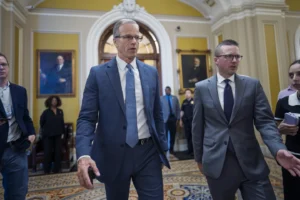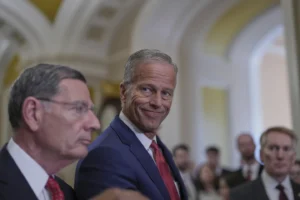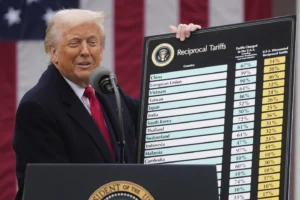Gordon, White House Trade Jabs Over Federal Emissions Reduction Funding
Wyoming’s governor rejected $5M in federal dollars he says would harm the oil and gas industry
- Published In: Politics
- Last Updated: Oct 05, 2023
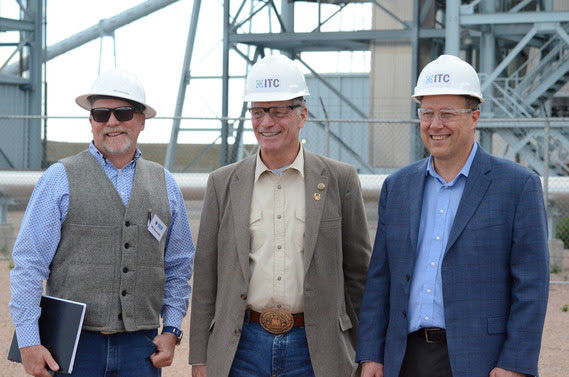
Gov. Mark Gordon announced this week he was rejecting $5 million in federal funding aimed at curbing methane emissions. (Photo via Gov. Mark Gordon)
By Jacob Gardenswartz
Special to the Wyoming Truth
WASHINGTON — Like most of Wyoming’s elected officials, Gov. Mark Gordon is no fan of the Biden administration — particularly when it comes to climate and environmental policy.
During his tenure, Gordon has sued the federal government attempting to force the sale of more oil and gas leases, decried administration policies seeking to improve water quality, denounced regulations curbing power plant pollution and sought the congressional nullification of a new land use policy aiming to boost conservation.
But Gordon’s ongoing feud with the feds took an unusual turn this week, when he formally announced the state’s rejection of over $5 million dollars in grant funding earmarked by Congress to assist private oil and gas well operators with methane emission reductions.
“This approach – concocted by DC bureaucrats – shows a complete disregard for the importance of this industry to Wyoming’s economy,” Gordon said in a statement on Monday. “These are wells that have, and will continue to produce, significant amounts of oil; provide jobs through hundreds of small businesses; and generate revenues for schools, the state and local government.”
In response, the White House shot back with some criticism of its own, telling the Wyoming Truth exclusively on Wednesday that it’s “unfortunate that some officials are putting politics ahead of people.”
“President Biden is a President for all Americans—and that’s why his historic legislation is cutting pollution and protecting communities in every state in the country,” said a White House official, who asked not to be named to enable them to speak more freely.
The funding, the official continued, “would help oil and gas companies voluntarily reduce methane emissions from their wells, cut pollution, and protect the health and safety of communities in their states.”
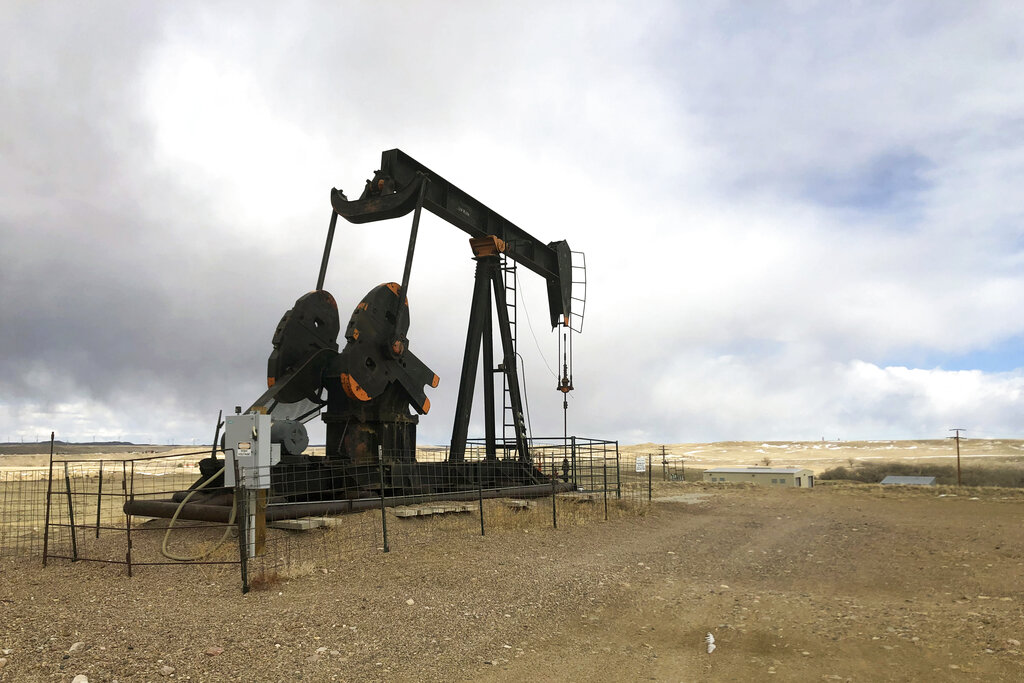
The money in question — $5,624,949 according to Department of Energy grant procurement documents — represents a relatively minor share of the state’s $9.7 billion overall budget. But the back-and-forth illustrates the complex and confounding position in which Wyoming finds itself, as the federal government prepares to spend trillions on climate mitigation and renewable energy development in the coming years.
On the one hand, the state is among those most poised to benefit from the Bipartisan Infrastructure Law and Inflation Reduction Act, owing to its identity as a major fossil fuel producer and its large swaths of land ripe for green energy development.
Politically, however, Wyoming couldn’t be further from supporting such provisions, with many of its leaders instead working to boost the fossil fuel industry in every way possible.
“As this administration continues to put our domestic energy producers on the backburner with its war on American energy, it is essential that we pause to recognize and celebrate their invaluable contributions to our daily lives that we so often take for granted,” Sen. Cynthia Lummis (R-Wyo.) said in a statement last week, introducing a Senate resolution to celebrate “National Energy Appreciation Day.”
So what’s the money for?
The $5 million Gordon is refusing comes from a pot of $350 million appropriated by Congress in the Inflation Reduction Act for the Methane Emissions Reduction Program. That funding, according to federal officials, is to be doled out in grants to states to help private oil and gas well operators reduce methane emissions from marginal conventional wells (MCWs).
Also known as stripper wells, such instruments are defined by the Interstate Oil and Gas Compact Commission as wells that produce less than 10 barrels of oil or 60,000 cubic feet of natural gas per day. Many of these wells previously produced far greater quantities of fuel, but have since seen production declines due to aging infrastructure or waning reservoirs.
According to federal figures, Wyoming is home to 9,493 MCWs on non-federal lands, just under 2% of the nation’s share. Over 2,000 of those are so-called “orphaned” wells, those which have been fully abandoned and left unremediated by operators.
While any kind of fossil fuel development produces pollution which can be detrimental to natural habitats and human health, multiple studies have found that MCWs may be associated with a disproportionately high share of methane emissions. One such report, conducted by researchers with the National Energy Technology Laboratory (NETL), found MCWs were responsible for roughly 60% of all U.S. natural gas facility emissions and 40% of all U.S. oil production emissions.
Methane, meanwhile, is the second most prevalent greenhouse gas in Earth’s atmosphere, behind only carbon dioxide. Though Methane breaks down significantly faster than CO2, it traps 80 times more heat, making it a key driver of climate change.
And while normal exposure to methane gas itself may not be widely dangerous, the pollutant is almost always released alongside other health-damaging air pollutants (HDAPs), chemicals which are known to cause birth defects, asthma and cancer even in small doses.
Why not take it?
Given the many negative climate and health outcomes associated with MCWs, why would Gordon refuse the money?
Wyoming, he argues, doesn’t need it.
“Even without this funding Wyoming leads the nation in plugging abandoned and orphan wells,” Gordon’s statement argued. “Since the coal bed methane boom, Wyoming has spent about $35 million plugging orphan wells so far. The orphan well program is funded by bonds provided by oil and gas operators as well as a conservation tax paid on sales of oil and gas.”
Of course, politics are surely at play, too. While the state may already be addressing orphaned wells, MCWs still in operation serve as a key employer in the declining oil and gas industry. Any support for programs further impacting those jobs would be seen as little more than an attack on Wyomingites’ lives and livelihoods.
So while the White House and environmental groups may tout the methane reduction program as free money to assist states with voluntary well remediation, oil and gas industry groups see it as little more than a direct affront.
“The Biden Administration offered Wyoming an insulting $5 million to ‘voluntarily’ erode our own economic base under the guise of emissions reduction, Pete Obermueller, Petroleum Association of Wyoming president, told the Wyoming Truth in a statement.
“If the Biden Administration was serious about emissions reductions, it would focus its dollars on partnering with Wyoming’s producers to improve emissions technologies. Instead, it simply wants to pay us pennies to throw away dollars.”

